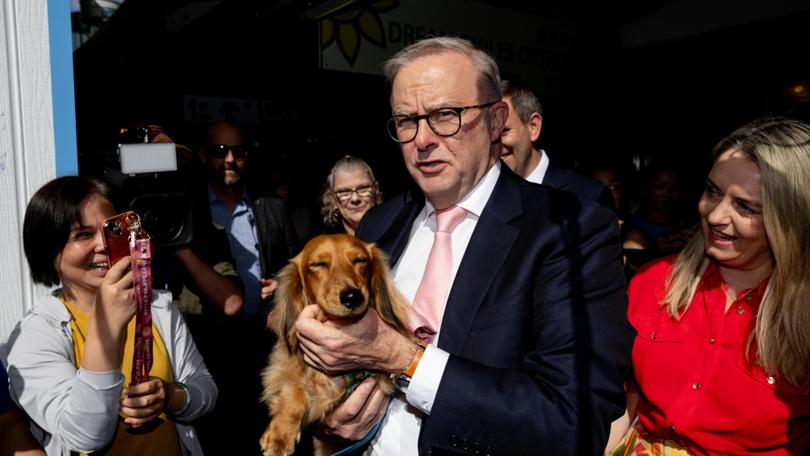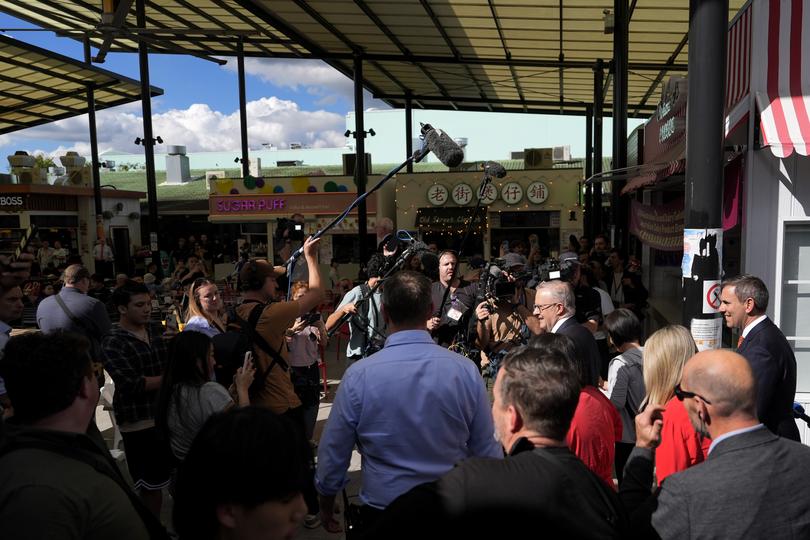Federal election 2025: AAA credit rating scramble dogs Labor in final days of campaign
A leading finance expert has described the Federal Government’s attempts to shore up its economic credentials by trimming consultant costs as ‘a bandaid on a flesh wound’.

Labor’s attempts to shore up its economic credentials by trimming consultant costs has been described as a “bandaid on a flesh wound” by one of Australia’s leading economists, who said the government should be “worried” about ongoing structural deficits.
The comments from Robert Breunig, director of the Tax and Transfer Policy Institute at ANU’s Crawford School of Public Policy, came as the debate over fiscal management dominated the campaign for a second straight day.
Yesterday, international ratings agency S&P Global warned that Australia was at risk of losing its coveted AAA rating on the back of tens of billions of promises designed to win over voters.
Sign up to The Nightly's newsletters.
Get the first look at the digital newspaper, curated daily stories and breaking headlines delivered to your inbox.
By continuing you agree to our Terms and Privacy Policy.Labor spent a second day defending its economic record by suggesting most of its spending programs were already budgeted for, and any new programs, such as the $10 billion first home buyer scheme would be financed by trimming $6.4b of government spending on consultants and labour hire firms.
But Mr Breunig, one of Australia’s leading public policy experts, said the cuts were a “band aid on a flesh wound” and that in his experience such efforts to strip public service costs “usually end up not eventuating”, often resulting in fired public sector workers being replaced by consultants, or reduced consultants replaced by bureaucrats.
Standard & Poor’s sounded the alarm on Monday that Australia’s public spending was at “post-war highs” and cautioned both major parties to find savings or risk losing the rating.
Treasurer Jim Chalmers said there would be ‘no reason to lose the AAA if Labor is re-elected”, and that the ratings agency should be “reassured by the fact that we finished this election campaign with the budget in a stronger position than when we started”.

Mr Albanese was asked multiple times at the same Tuesday press conference whether the report was wrong, but skated over the question every time.
He was also forced to defend comments he made on Monday night, that S&P must have been “beside themselves” about the deficit inherited from the former Government.
“What I was doing last night was pointing out a fact. That we have been responsible economic managers,” he said.
Opposition Leader Peter Dutton also brushed off the criticism from S&P Global, and said the Coalition was best placed to manage the budget.
Pointing to “supports which don’t have recurrent spend year-after-year” like the fuel excise cut and the $1200 tax rebate, Mr Dutton said not locking those expenses in would benefit the budget.
“We’ll always manage the economy more effectively and Labor will always spend more,” he said.
The Coalition have yet to release their costings for an estimated $61b of promises since January and will need to do so in the next few days before election day.
Mr Breunig said the next government should be “worried” about S&P’s warning that large structural deficits and high debt were becoming a problem.
“For 20 years, we’ve been pretty disciplined in terms of balancing our budgets. COVID seems to have completely broken that and suddenly no one seems bothered,” Mr Breunig said.
“Both parties are throwing out these big expenditure commitments and if you’re start spending beyond your means, and your credit rating internationally gets reduced, then suddenly you’re paying big interest rate on that debt, and that can be a bad strategy for small, open economies (like Australia).”
APS a political football
Mr Albanese on Tuesday denied he was cutting services to the public, as he had accused Mr Dutton of doing with his plans to cut 41,000 public servants.
Dr Chalmers said there was a “very important difference”.
“The savings that we are making build on the progress that Katy and the team have made over the first three years, saving billions of dollars, investing in the capacity of the Australian public service, but winding back some of these outrageous levels of spending on contractors and consultants,” he said.
“We’ll make these savings without coming after people or wages or programs, and that’s another really important difference here.”
That sentiment was welcomed by the Community and Public Sector Union National Secretary Melissa Donnelly who approved of the Govenment’s plan to “invest in a strong, capable public service.”
But Greens Senator Barbara Pocock said the cuts were “meaningless” and said the Government had only reduced spending on consultants by $40m in 2024 and was “roughly $40 million less than the Morrison Government spent in 2021-22.”
“All this talk about getting rid of consultants from the public service is just a smoke screen for business as usual. Instead of bringing that work back into the public service, the Government has simply outsourced nearly all of it to smaller consulting firms,” Ms Pocock said.
The Big Four consulting firms have been reducing their exposure to government contracts, according to sources who were unwilling to talk on the record, while Scyne, the public sector consulting spinoff from PwC has announced ten per cent of staff would be retrenched this month, following the loss of 90 jobs last year.
Stephen Bartos, a former Deputy Secretary in the Department of Finance who served under Fraser, Hawke-Keating, and Howard governments, who is now Head of the National Institute of Governance at the University of Canberra said the savings would likely be found by requiring department heads to trim their budgets.
He expected that current contracts would not be broken, but instead future activities would be taken in house.
“You can take out consultants particularly in relation to giving policy advice, running reviews. Those are areas where it’s going to be relatively easy to replace them with public servants,” Mr Bartos said.
Mr Bartos said that there had been a “loss of policy capacity” as a result of previous public sector cuts, meaning the Government was still reliant on consultants.
“It will take many years for that to wash out of the system,” he said.
